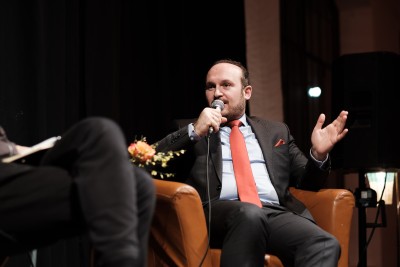Islamic Religious Community in Austria on Shaping the Coexistence between the State and Religions
With its symposium on the topic "Islam Law 2015 - A Best Practice Model?", the Islamic Religious Community in Austria (IGGÖ) supposedly created a framework for open discussions of different experts on the inadequate combination of two religious societies in a single religious law, on encroachments on the fundamental right to freedom of religion and association and the internal affairs of the IGGÖ as well as on its disadvantageous position compared to other churches and religious societies.
 IGGÖ President Ümit Vural stressed adequate measures should be formulated constructively on a partnership basis, "in the proven model of cooperation between the state and religions, which we in Austria otherwise look upon so proudly." / Picture: © Flickr / Figlhaus Wien Akademie für Dialog und Evangelisation / [CC BY-SA 2.0(https://creativecommons.org/licenses/by-sa/2.0/)]
IGGÖ President Ümit Vural stressed adequate measures should be formulated constructively on a partnership basis, "in the proven model of cooperation between the state and religions, which we in Austria otherwise look upon so proudly." / Picture: © Flickr / Figlhaus Wien Akademie für Dialog und Evangelisation / [CC BY-SA 2.0(https://creativecommons.org/licenses/by-sa/2.0/)]
The debate on the amendment of the Islam Act 2015 and its amendment in 2021 was accompanied by critical voices within and outside the Muslim community. Stefan Schima from the University of Vienna, for example, pointed out that the Islam Act contains regulations and administrative penalty provisions that are unique in Austria's religious law landscape.
In his address, IGGÖ President Ümit Vural emphasized that he did not want to deny the existing challenges. However, he said, it was a matter of formulating adequate measures constructively on a partnership basis, "in the tried and tested model of cooperation between the state and religions, of which we in Austria are otherwise so proud."
The Protestant Bishop Michael Chalupka also noted a paradigm shift in the state's dealings with religions and the basic tone of the Islam Law, which is characterized by mistrust. The inadequate involvement of the IGGÖ in the amendment process for basically all religious communities in the country is alarming: From the abolition of Good Friday as a holiday, the Protestant Church knows "that inclusion does not always mean dialogue and certainly no agreement," said Chalupka.
A commission of experts is now to work through the results of the symposium within a year and present concrete proposals for improvement to the federal government. The contents of the symposium will also be published in a book.
"Our constant task as a religious community is to ensure that Muslims in Austria can practice their religion following the freedom of religion guaranteed by the constitution," says Vural. To be able to carry out its legal mandate adequately and to guarantee independence from foreign countries, the IGGÖ must in any case receive more support from the state, added Murat Özdemir, member of the Board of Governors.



